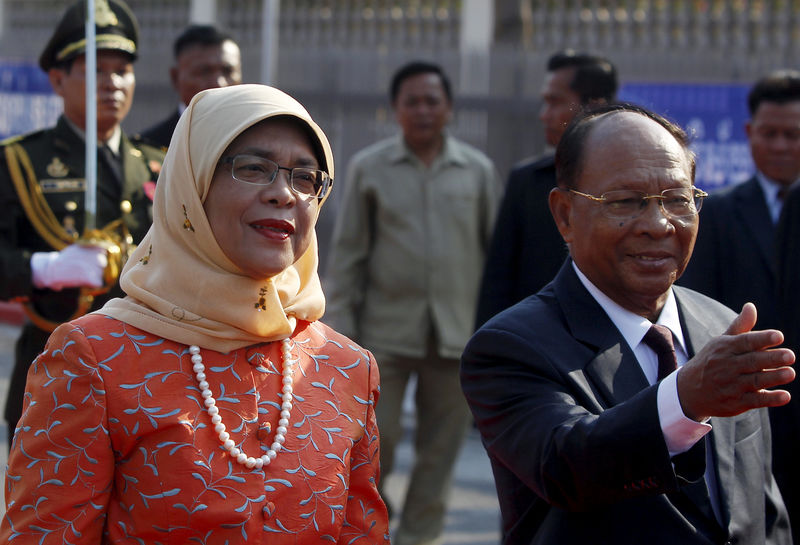By Fathin Ungku and Karishma Singh
SINGAPORE (Reuters) - There are no Muslim Malays in the top echelons of Singapore's army, and few among the senior ranks of its judiciary, but a member of its poorest ethnic minority will become president of the Southeast Asian city state this month.
Aiming to strengthen a sense of inclusivity in the multicultural country, Singapore has decreed the Sept. 23 election for the largely ceremonial post of president will be reserved for candidates from the Malay community this time.
Even among the presidential hopefuls, however, there is some regret that ethnic Malays still need a leg up.
"It is my hope that in the near future the issue of Malay representation ceases to be relevant in the Singapore context," said Salleh Marican, a businessman waiting to hear if his election candidacy has been accepted.
Among the other two Malay candidates who have declared their intention to run, Halimah Yacob, the former speaker of Singapore's parliament, could become the first female head of state if her bid is successful.
Her experience as house speaker automatically qualifies her under the nomination rules, but her rivals, businessmen Farid Khan and Marican, could be disqualified if a presidential elections panel deems their businesses too small to demonstrate the required levels of responsibility.
The panel will announce its decision by Wednesday.
Halimah declined to comment for this report.
The last Malay to hold the presidency was Yusof Ishak, whose image adorns the country's banknotes.
Yusof was president between 1965 and 1970, the first years of Singapore's independence following a short-lived union with neighbouring Malaysia, but executive power lay with Lee Kuan Yew, the country's first prime minister.
The separation of Singapore from Malaysia gave ethnic Malays a clear majority in Malaysia, while ethnic Chinese formed the majority in independent Singapore.
PRESERVING HARMONY
Leaders of both countries, however, recognised that peace and prosperity depended on preserving harmony between the two groups.
But living in a Muslim-dominated neighbourhood, with Malaysia and Indonesia next door, Singapore's leaders have long worried about the risk of conflicted loyalties among Malays.
"You put in a Malay officer who's very religious and who has family ties in Malaysia in charge of a machine-gun unit, that's a very tricky business," the late Lee Kuan Yew was widely quoted as saying in 1999.
For Lee, whose son, Lee Hsien Loong, is now prime minister, the answer to social cohesion lay in creating a culture of meritocracy, rather than adopting policies of positive discrimination to boost the chances of advancement for Singapore's Malay and Indian minorities.
Still, a government report published in 2013 found Malays felt they were sometimes discriminated against and had limited prospects in some institutions, such as the armed forces.
Singapore's economic success and education policies have helped swell the ranks of middle-class Malays, but the last census in 2010 showed they lagged other ethnic groups on socio-economic measures such as household incomes and home ownership.
Malays, who form just over 13 percent of Singapore's 3.9 million citizens and permanent residents, also underperform on measures such as university and secondary school education.
Despite being the establishment candidate, Halimah wears a hijab, which is banned in state schools and public sector jobs that require uniforms. But she has seldom spoken publicly on the issue and there is little sign of change in official attitudes.
Khan, the chairman of marine services firm Bourbon Offshore Asia, told Reuters more Malays hold political office, and some are making their way in the corporate world, but "There is still room for improvement."
The prospect of a Malay president is by itself unlikely to resolve concerns over underrepresentation, but analysts and advocates say it could help foster trust among communities.
Yet the reserved election has also injured some pride.

"It cheapens the credibility of a Malay person that it requires a token election for us to be president," said Malay comedian and television personality Hirzi Zulkiflie. "Some people intending to run are very capable."